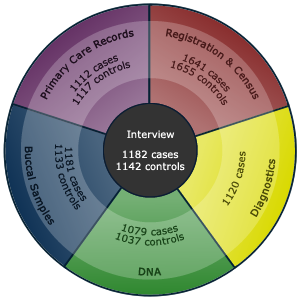About
The ELCCS was set up by EGU in 1998 to investigate possible causes of lymphoma. Environmental and lifestyle
exposures such as smoking, alcohol and obesity; a family history of disease and other genetic factors; and
preceding illnesses and health events are some of the areas of research we are interested in. As lymphomas
are recognized as a group of diseases with varied clinical features, the examination of risk factors by the
different lymphoma subtypes is a particular feature of ELCCS.
Study Population
-
Adults (16-69 years) registered for primary care with a general practitioner and resident in the study area
Cases - ascertained from:
-
Haematological Malignancy Diagnostic Service
(www.hmds.org.uk)
-
Treating / referring hospitals
Controls - 1 per case selected from
primary care population registers, individually matched on:
-
Sex
-
Age
-
ELCCS region of residence
The study was approved by the UK’s Multi-Regional Ethical Committee and followed standardised methods of data
collection. Details of the study design, study documentation and publications can be found elsewhere on the
website. To illustrate the data collection process, see the flowchart below.
Following data collection, residential postcodes for the address at ascertainment were linked to small area census
data. Diagnostic information was obtained from the Haematological Malignancy Diagnostic Service
(www.hmds.org.uk)
in the Yorkshire region; elsewhere, diagnostic data extracted from hospital notes underwent central pathological
review. Biological samples were, where possible, taken and stored. The final datasets and numbers available
are shown in the following diagram.

Studies of lymphoma similar in design to ELCCS are being conducted in other parts of the world, including in Europe,
Australia, and North America. Two collaborative ventures which ELCCS researchers contribute are the Collaborative
European action into Environmental, Nutritional and Genetic factors in Non-Hodgkin's Lymphoma
(EuroLymph) and the
International Lymphoma Epidemiology Consortium
(InterLymph).
Both projects operate as scientific forums to discuss
and develop research into lymphomas. One of their main functions is to facilitate the pooling of study data to
increase the amount of information available to investigate possible risk factors; findings from several pooled
analyses are available on this website.